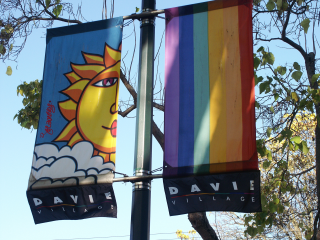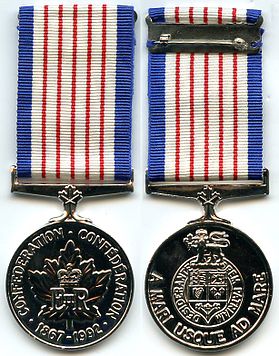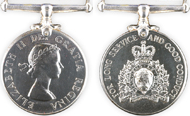Related Research Articles

The Order of British Columbia is a civilian honour for merit in the Canadian province of British Columbia. Instituted in 1989 by Lieutenant Governor David Lam, on the advice of the Cabinet under Premier Bill Vander Zalm, the order is administered by the Governor-in-Council and is intended to honour current or former British Columbia residents for conspicuous achievements in any field, being thus described as the highest honour amongst all others conferred by the British Columbia Crown.

Joe Average is a Canadian artist who resides in Vancouver, British Columbia. Diagnosed HIV+ at age 27, Average made the decision to commit the rest of his life to art, and to challenge himself to live by his art. He was born in Victoria, British Columbia, Canada.

The 125th Anniversary of the Confederation of Canada Medal is a commemorative medal struck by the Royal Canadian Mint to commemorate the 125th anniversary of the Confederation of Canada and was awarded to Canadians who were deemed to have made a significant contribution to their fellow citizens, to their community, or to Canada. Nominations were submitted to lieutenant governors and territorial commissioners, senators, members of parliament, provincial governments, the Public Service Commission of Canada, the Canadian Forces, the Royal Canadian Mounted Police, and various federal government departments, as well as organizations throughout the country, and some 42,000 medals were awarded.
The Canadian Centennial Medal is a commemorative medal struck by the Royal Canadian Mint in 1967 to commemorate the 100th anniversary of the Canadian Confederation and was awarded to Canadians who were recommended by government, professional, educational and cultural associations, as well as military and protective services, veterans' groups, sports associations, and philanthropic and charitable bodies, for having provided valuable service to Canada. Some 29,500 medals were issued after its inauguration on 1 July 1967, of which 8,500 went to personnel in the Canadian Forces.

Insite is a supervised drug injection site in the Downtown Eastside (DTES) neighbourhood of Vancouver, British Columbia, Canada The DTES had 4,700 chronic drug users in 2000 and has been considered to be the centre of an "injection drug epidemic". The site provides a supervised and health-focused location for injection drug use, primarily heroin. The clinic does not supply any drugs. Medical staff are present to provide addiction treatment, mental health assistance, and first aid in the event of an overdose or wound. In 2017, the site recorded 175,464 visits by 7,301 unique users; 2,151 overdoses occurred with no fatalities, due to intervention by medical staff. The site also offers a free checking service so clients can check their substances for fentanyl and carfentanil. Health Canada has provided $500,000 per year to operate the site, and the BC Ministry of Health contributed $1,200,000 to renovate the site and cover operating costs. Insite also serves as a resource for those seeking to use a harm reduction approach for people who inject drugs around the world. In recent months and years, delegations from a number of countries are on record touring the facility, including various U.S. states, Colombia and Brazil. 95% of drug users who use Insite also inject on the street according to a British Columbia health official.
Stewart Lynn "Stu" Blusson, is a Canadian geologist, helicopter pilot, businessman, diamond magnate and philanthropist. He co-discovered billion-dollar Ekati Diamond Mine, 300 kilometres from Yellowknife, Northwest Territories, Canada. He is President of Archon Minerals Ltd. In 2002, Blusson donated key start-up funds necessary for Quest University Canada in Squamish, British Columbia. In 2006, Blusson donated $10 million for the Archon X PRIZE to develop a quick and inexpensive way to sequence the human genome. Blusson had a net worth of $660 million CDN in 2006.
John Wilfred Turvey, was a long-time advocate for the disadvantaged in Vancouver, British Columbia. After becoming a heroin addict at 13 years old and dropping out of Barr Beacon School in year 10, John Turvey went on to found and serve as the Executive Director of the Downtown Eastside Youth Activities Society for 20 years. He died of mitochondrial myopathy in Comox, British Columbia at the age of 61.

HIV/AIDS was first detected in Canada in 1982. In 2018, there were approximately 62,050 people living with HIV/AIDS in Canada. It was estimated that 8,300 people were living with undiagnosed HIV in 2018. Mortality has decreased due to medical advances against HIV/AIDS, especially highly active antiretroviral therapy (HAART).

Mel Krajden is a physician and professor of Pathology and Laboratory Medicine at the University of British Columbia in Vancouver, British Columbia, Canada. He is the medical director of the BCCDC Public Health Laboratory. Dr. Krajden obtained his BSc, MD, and FRCPC at McGill University, followed by a fellowship in Infectious Diseases at Stanford University. He is also the medical director of the Public Health Laboratory at the British Columbia Centre for Disease Control. His research focuses on the prevention and care of hepatitis, human papillomavirus, and human immunodeficiency virus.
AIDS Vancouver, founded in early 1983, is recognized as one of the first community-based non-profit AIDS organizations in Canada, responding to the HIV/AIDS crisis in the Vancouver area. Led by co-founders Gordon Price, Noah Stewart, Dr. Mike Maynard, Daryl Nelson, and Ron Alexander Slater, the organization has aimed to provide support, education, and advocacy for individuals affected by HIV/AIDS. With a focus on grassroots efforts and community mobilization, AIDS Vancouver has been involved in efforts to address the spread of HIV and support individuals living with the virus.

The Royal Canadian Mounted Police Long Service Medal was established by royal warrant on 6 March 1934 by King George V. It is the oldest continually awarded honour within the Canadian honours system, and the first created specifically for Canadian service within Canada. Initially proposed by the Royal North-West Mounted Police Veterans’ Association, it took more than ten years for the proposal to be realized. The determination of the veterans was aided by the interest of Commissioner Cortlandt Starnes and Prime Minister R.B. Bennett.
Julio S. G. Montaner, is an Argentine-Canadian physician, professor and researcher. He is the director of the British Columbia Centre for Excellence in HIV/AIDS, the chair in AIDS Research and head of the Division of AIDS in the Faculty of Medicine at the University of British Columbia and the past-president of the International AIDS Society. He is also the director of the John Ruedy Immunodeficiency Clinic, and the Physician Program Director for HIV/AIDS PHC. He is known for his work on HAART, a role in the discovery of triple therapy as an effective treatment for HIV in the late 1990s, and a role in advocating the "Treatment as Prevention" Strategy in the mid-2000s, led by Myron Cohen of the HPTN 052 trial.
Martin T. Schechter is a Canadian epidemiologist recognized for contributions to research about HIV prevention and treatments, addiction research, and Indigenous health research. He is a professor and was the founding director of the School of Population and Public Health in the Faculty of Medicine at the University of British Columbia (UBC). Schechter received his Order of British Columbia in 1994 alongside BC's first Nobel Prize laureate Michael Smith and noted Indigenous artist Bill Reid. In 2022, Schechter was named as a Member of the Order of Canada.
Nigel Francis Scarth Rusted, was a Canadian medical doctor. He is credited with having made outstanding contributions to the medical profession in Newfoundland and Labrador.
Perry Kendall, is a Canadian Public health physician who was Provincial Health Officer (PHO) for the Canadian province of British Columbia's health ministry from 1999-2018 and was awarded the Order of British Columbia for contributions to Public health field and to harm reduction policy and practice.

The Medal of Service of the Order of Canada was a decoration that was, within the Canadian system of honours, created at the same time as the Companion level of the Order of Canada and the Medal of Courage of the Order of Canada. The federal cabinet had refused to allow for the establishment of a multi-levelled national order, and thus the Medal of Service was established as a second tier to the Companion level.
B. Brett Finlay, is a Canadian microbiologist well known for his contributions to understanding how microbes cause disease in people and developing new tools for fighting infections, as well as the role the microbiota plays in human health and disease. Science.ca describes him as one of the world's foremost experts on the molecular understanding of the ways bacteria infect their hosts. He also led the SARS Accelerated Vaccine Initiative (SAVI) and developed vaccines to SARS and a bovine vaccine to E. coli O157:H7. His current research interests focus on pathogenic E. coli and Salmonella pathogenicity, and the role of the microbiota in infections, asthma, and malnutrition. He is currently the UBC Peter Wall Distinguished Professor and a Professor in the Michael Smith Laboratories, Microbiology and Immunology, and Biochemistry and Molecular Biology, and Co-director and Senior Fellow for the CIFAR Humans and Microbes program. He is also co-author of the book Let Them Eat Dirt: Saving Your Child from an Oversanitized World and The Whole-Body Microbiome: How to Harness Microbes - Inside and Out - For Lifelong Health. Finlay is the author of over 500 publications in peer-reviewed journals and served as editor of several professional publications for many years.

Bonnie J. Fraser Henry is a Canadian physician and public servant who has been the provincial health officer at the British Columbia Ministry of Health since 2014. Henry is also a clinical associate professor at the University of British Columbia. She is a specialist in public health and preventive medicine, and is a family doctor. In her role as provincial health officer, Henry notably led the response to COVID-19 in British Columbia (BC).
André Pierre Picard is a Canadian journalist and author specializing in health care issues. He works as a reporter and a columnist for the national newspaper The Globe and Mail. As of 2020, he runs the news organization's office in Montreal. He currently lives in Vancouver.
Robert Conrad Brunham is a Canadian infectious disease specialist. He is the former Director of the UBC Centre for Disease Control and executive director and Scientific Director of the British Columbia Centre for Disease Control.
References
- 1 2 Kendall, Perry (December 2007). "Dr John Blatherwick—An appreciation". BC Medical Journal. 49 (10): 578. Retrieved 10 February 2024.
- ↑ "Honorary Degree Citation" (PDF). Simon Fraser University. 7 October 2021. Retrieved 10 February 2024.
- ↑ "Dr. John Blatherwick's Advocacy During the Early Days of the AIDS Epidemic". 30 30 AIDS Vancouver on YouTube. 24 March 2014. Event occurs at 0m25s. Retrieved 10 February 2024.
I got to battle the AIDS epidemic from the front pages of the newspaper, on the evening news, radio and television, and all the talk shows.
- ↑ "PHS Community Services Society v. Attorney General of Canada". Supreme Court of British Columbia. 2008. Retrieved 10 February 2024.
- ↑ Bardsley, J.; Turvey, J.; Blatherwick, J. (February 1990). "Vancouver's needle exchange program". Can J Public Health. 81 (1): 39–45. PMID 2311049.
- ↑ Wainberg, Mark A. (November 2006). "The need to promote public health in the field of illicit drug use". CMAJ. 175 (11): 1395. doi:10.1503/cmaj.061404. PMC 1635773 .
- ↑ Pamela Fayerman (8 April 2003). "Global Virus SARS under control in B.C." The Vancouver Sun. Retrieved 10 February 2024.
- ↑ Naval Association of Canada (24 Feb 2021). "A History of Honours in Canada" . Retrieved 10 February 2024.
- ↑ John MacFarlane (2011). "John Blatherwick - Expert in Medals and Decorations" . Retrieved 10 February 2024.
- ↑ "Francis John Blatherwick's Order of Canada Citation". Governor General of Canada. Retrieved 8 April 2022.
- ↑ "2007 Recipient: Dr. Francis John Blatherwick – New Westminster". Government of British Columbia. Retrieved 8 April 2022.
- ↑ "Francis John Blatherwick's Golden Jubilee Medal Citation". Governor General of Canada. Retrieved 8 April 2022.
- ↑ "Francis John Blatherwick's Diamond Jubilee Medal Citation". Governor General of Canada. Retrieved 8 April 2022.
- Trailblazing doctor to retire: Public health took precedence over prudery, politics, business, By Don Harrison, The Province , Published May 29, 2007
- Blatherwick looking to spend time with family, By Kelly Sinoski, Vancouver Sun, Published May 29, 2007
- From SARS to salmonella, health officer never backed down, By Mark Hume, The Globe and Mail , Published May 29, 2007
- CANADA’S LONGEST-SERVING MEDICAL HEALTH OFFICER RETIRES, news release, Vancouver Coastal Health, May 28, 2007
- Kent, Heather (April 2002). "Captain Condom captures Vancouver". CMAJ. 166 (9): 1200. PMC 102380 .